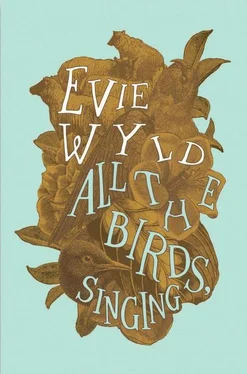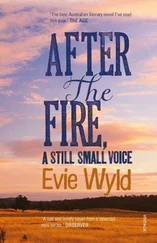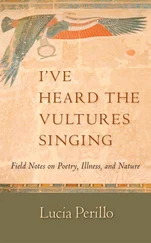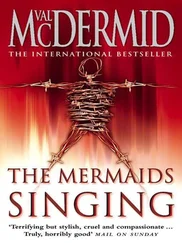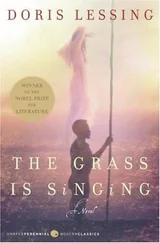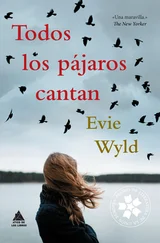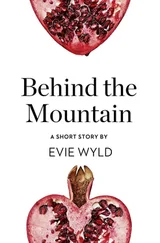Dog was snuffing at the shed door and barked. The cough again, this time followed by a moan. Blood pumped in my fists. Just a wounded fox , I thought, just the wind rattling through a fracture in the grate, just a ringing in my ears.
The shed door was a crack open and inside the darkness coddled like black water. Dog disappeared into it and I cocked the gun and went for the switch. The light blinked on, ticking, flashing green and then yellow, and I watched in slices as in the corner Dog attacked something large, hacking and snarling. I was stuck for a moment with my mouth open, then I trained my gun.
‘Jesus!’ screamed a man’s voice. Dog had hold of his wrist, shook it hard.
‘Who the fuck are you?’ I shouted and whether I meant it or not, my gun went off. Dog fell to the floor, and for a terrible second I thought I’d shot him, but he was just gun-shy. The man covered his face with his hands and didn’t move. My arms shook, and I lowered the gun. No one was dead, and the man didn’t appear shot. I had to put the gun down before I dropped it.
‘What do you want? Did you kill my sheep? Who sent you?’ I barked. The man didn’t answer, just sat there, covering his face.
Dog sloped back to stand next to me, his fight gone.
‘What do you want?’ I said again loudly. I thought about getting the gun again but my arms had lost their strength, I felt them flapping at my sides.
‘I want to sleep,’ said the man. ‘I only want to sleep.’ His voice was thick and swollen, just a croak. He lowered his hands. It was the man from the hedgerow. ‘You didn’t have to shoot at me,’ he said and met my eyes. ‘God,’ he said, ‘you look awful. Do you cut your own hair?’
I took a step forward to look at him in the green light. A wet sleeping bag draped around his shoulders.
‘Why are you here?’ I asked again in my most menacing voice. I could smell the drink on him. His beard had crept up to the very tops of his cheeks. His exposed hand had a number of punctures in it, from Dog. I swallowed. ‘What do you want from me?’
‘I just wanted to sleep in your shed—’ The end of his sentence collapsed into a coughing fit.
I cleared my throat. ‘Is it you? Have you been killing my sheep? Have you been in my house? Have you been banging around in my house at night?’
He looked at me with eyes pink from coughing. His jaw shuddered from the cold. ‘I don’t understand you,’ he said.
There was a fleck of blood on his lower lip, from where he must’ve bit himself.
He looked at me, one of his eyes drooped a little. ‘I did not kill a sheep.’
He was having trouble keeping his eyes open. My heart pumped thickly.
‘I didn’t shoot you, did I?’
He opened his eyes again. ‘What on earth are you on about now?’ he said, exasperated, like I was bothering him with some kind of ridiculous information. Rain had started up and it drummed on the roof. I didn’t know how I could move him.
‘I’ll call the police if you don’t leave right now,’ I said. The man made no response. I watched him for some time. He didn’t move, just his chest rising and falling, just the moustache hairs blowing in his breath. I nudged him hard in the leg with the toe of my boot.
‘You can stay here the night,’ I said. He opened his eyes wide again. ‘But in the morning, you have to leave.’
‘Thank you.’
‘If you don’t leave in the morning, I will shoot you,’ I said, but his eyes had closed and he was already asleep.
He was sitting on the bare concrete, wrapped sadly in his wet sleeping bag. I left him there, turning off the light as I went and taking my gun.
It could have been the air, the wind. It could have been that out there in the dark, all of my sheep had turned to stare at me. Or that something pulled itself out of the sea and lumbered up the path towards me. But it wasn’t. It was only the night like I’d seen it a thousand times before, alone.
Inside, I looked at the telephone, imagined the sergeant’s face and then turned away from it again. I thought of how Don’d tell me to call on those young farmers.
In the kitchen I looked at the bread I’d cut. I put the coffee back on the stove and sat down. I got up and went to the boiler cupboard and found a scratchy blanket and took it back out to the shed. I could hear his breath wheezing in and out of him at the doorway, and I didn’t need the light on to know where he was and that he was still sleeping. I cleared my throat a few times, but he didn’t wake and so I laid the blanket over him then walked back to the house, trying to go without urgency. I bolted the door and checked the windows.
I poured whisky into my coffee and took it upstairs to bed. Dog came with me. I sat on the edge of the bed a while and then went back downstairs with Dog. I pointed at the front door. ‘Stay,’ I said, and Dog raised his eyebrows, but lay down with his chin on his paws.
I took the bottle of whisky up with me, and half an hour later came back down the stairs and found Dog curled on the sofa. I rang home and no one answered, everyone was out, living their lives in the way that they did. If the phone was in the same place in the hallway, resting on its same wicker cabinet, it faced out towards the front garden, unkempt, fireweed and dead leaves, brown snakes and bindi-eye. Butcher birds caught mice in those places, speared them on the branches of the jacaranda, dead mice and voles. I hung up. I collected all the knives I could find into a roasting tin, and on second thoughts the carving fork too, and took them up to bed with me. I turned off the light and pulled a stool to the window and propped the gun up next to it. I sat and waited for my eyes to get used to the dark and I watched the door of the shed with a mug of whisky in my hand.
By the time I reach Kalgoorlie, something is rattling badly under the bonnet of the truck. The kangaroo seems a long time ago, but it did more damage than I’d first thought. There are no papers in the glove compartment, only WD-40, an open bag of peanuts and an empty pack of condoms. The best I can do for her is to sell her to a scrapyard. I cut the engine in the wreckers’ yard and count the ticks for the last time. When they stop, I know I’ve arrived somewhere else.
Along the journey the roll of money from Otto’s tin became thin, and there have been moments when, sat in the truck in the dark, I’ve thought about going back to the old way. But that person is like someone I’ve never known. The thought of it — of the flesh and the smell and noise of it, the ache and hollow afterwards, the taste that makes drink curdle and turn thick in your throat — it makes me clench my fists so that my nails dig into my palms. I have had dreams sleeping in the locked cab of the truck of gritting my teeth until they break, until they shatter inside my mouth, and when I wake up I expect to see his face at the window, looking in at me. Some nights I’ve woken up and I can hear someone singing, Is it you or is it me? Lately I’ve been lost it seems … and then it turns out just to be the drill of a nightjar, or a fruit bat complaining in its tree. While the sun comes up I stare at myself in the rear-view mirror, holding my own gaze until I am just a blur, like when you say your own name over and over until it doesn’t make sense any more.
I only get $45 for the truck, but there is something good about thinking of it taken apart, limb from limb, the licence plate nailed up on a wall, just one among hundreds, unseen and ignored, the last link to him disintegrated and untraceable. I spend the last of the money on a sleeping bag, a change of clothes and a backpack to put it all in.
‘Those are big bloody bastards,’ says a man called Alan, holding my palms open on the bar of the Fleeced Lamb in Kalgoorlie. There’s something in the businesslike way he holds my hands which makes me relax — like he’s looking at the hoof of a goat. ‘You’ll be right, love,’ he says. ‘Look like you can bloody look after yourself, I bloody reckon.’ He lets go of my hands, and drains his drink before fixing me with his eyes again. ‘Reckon you’re the sort with an old soul, and that’s just the sort I like.’
Читать дальше
